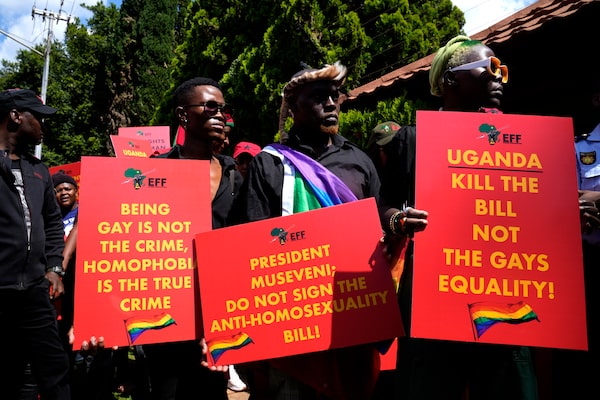
Activists hold placards during their picket against Uganda's anti-homosexuality bill at the Ugandan High Commission in Pretoria, South Africa on April 4. Uganda's president Yoweri Museveni has signed into law tough new anti-gay legislation on May 29, that was supported by many in the country but widely condemned by rights activists and others abroad.Themba Hadebe/The Associated Press
Uganda has given final approval to one of the world’s harshest anti-homosexuality laws, sparking a wave of global outrage and rising concern about the fate of LGBTQ activists and people with HIV in the East African country.
The law, approved by President Yoweri Museveni on Monday, authorizes the death penalty for the vaguely defined act of “aggravated homosexuality.” Among the lengthy list of death-penalty offences are same-sex acts involving “serial offenders” or people of “advanced age” or anyone “impaired” by alcohol or any other substance.
The law also authorizes a 20-year prison sentence for anyone who “promotes” or “normalizes” homosexuality, including in print or broadcast media.
Uganda already has a law to criminalize homosexuality, but many of its politicians have been pushing for more than a decade to toughen the law. Christian evangelical leaders, including U.S. religious groups with Ugandan followers, have strongly supported the new law. An earlier attempt at a harsher law in 2014 was struck down by the Ugandan courts on a technicality.
Canadian Foreign Affairs Minister Mélanie Joly said the new law was “abhorrent, cruel and unjust.” She said the Canadian government will stand with Uganda’s LGBTQ community in “pushing back against the rising crackdown on their human rights.”
U.S. President Joe Biden said the new law was “shameful.” In a statement on Monday, he warned that the United States is considering sanctions and travel restrictions against Ugandan officials, and he said the country could also lose U.S. trade concessions and health programs.
Reports of violence and discrimination against LGBTQ Ugandans have increased since the law was first introduced in parliament, Mr. Biden said. “Innocent Ugandans now fear going to hospitals, clinics or other establishments to receive lifesaving medical care. Some have been evicted from their homes or fired from their jobs.”
Britain and the European Union also condemned the law. The United Nations human-rights office said it was appalled by the “draconian” law, which it called “a recipe for systematic violations” of the rights of LGBTQ people and other Ugandans.
More than 30 African countries have laws that criminalize homosexuality. But harsher laws have been proposed in several African countries in recent months.
Under the new law, Ugandans – including health workers – can be jailed for up to five years if they fail to tell the police about any “reasonable suspicion” that someone “intends to commit the offence of homosexuality.”
The leaders of three global AIDS programs – the UN AIDS agency, the Global Fund and the U.S. President’s AIDS relief program, known as PEPFAR – said they were deeply concerned that the new law will be harmful to Ugandans.
“Uganda’s progress on its HIV response is now in grave jeopardy,” they said in a joint statement. “The stigma and discrimination associated with the passage of the Act has already led to reduced access to prevention as well as treatment services. … LGBTQ people in Uganda increasingly fear for their safety and security, and increasing numbers of people are being discouraged from seeking vital health services for fear of attack, punishment and further marginalization.”
Despite the widespread criticism from global leaders and Ugandan activists, the anti-homosexuality law was overwhelmingly approved in two parliamentary votes over the past two months and was celebrated by Ugandan church groups on Monday. After the first vote, the legislation was slightly amended, removing a clause that made it illegal merely to identify as LGBTQ, but most of its provisions were retained.
Uganda’s parliamentary Speaker, Anita Among, urged the police to begin enforcing the new law immediately. She praised MPs for withstanding pressure from “bullies” in the West. “We have a culture to protect,” she told Ugandan media. “The Western world will not come to rule Uganda.”
Mr. Museveni complained to the Ugandan media that international AIDS donor groups are “threatening to kill our 1.2 million people who have been surviving on PEPFAR funds” for their lifesaving HIV medicine.
The law, like the 2014 version, will be challenged in Uganda’s courts. Eleven human-rights activists and legal experts, including an MP and two law professors, filed a petition in Uganda’s Constitutional Court within hours of the law’s approval. They said the law would create “a culture of hatred” and would violate the Ugandan constitution’s protections for personal freedom and dignity.
Hate speech and violence against LGBTQ people have increased in Uganda in recent months, with dozens of people reporting incidents of mob attacks, arrests or evictions.
“I find it absurd to hear leaders promote hate and exclusion as African values,” Ugandan LGBTQ activist Kasha Jacqueline Nabagesera said in a statement on Monday. “The threats and violence our communities are facing are already horrifying. The passing of this law makes the situation even worse.”
 Geoffrey York
Geoffrey York